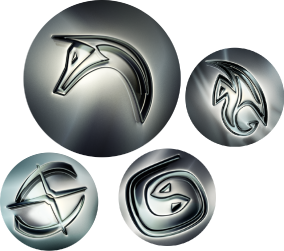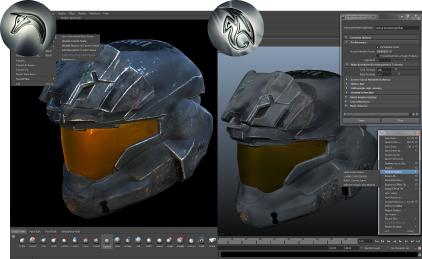You can export your work from Mudbox and quickly import it into Maya, 3ds Max, Softimage, or Flame using File > Send to [Autodesk product]. Send to exports from Mudbox using the Autodesk® FBX® file format. See also Export a Mudbox model using FBX.
The Send to options are designed support a common, iterative, round-tripping workflow that lets a production start with a scene in a content creation application (Maya, 3ds Max, Softimage, or Flame), export the content to Mudbox for added paint or sculpting detail, then merge back to the original scene.

- [Autodesk product] refers to Maya, 3ds Max, Softimage, or Flame, unless otherwise specified.
- You can find similar options for exporting to Mudbox in Maya, 3ds Max, Softimage, and Flame. For more information, refer to the Maya, 3ds Max,Softimage, or Flame Help. The Send to Mudbox option is not compatible with versions of Mudbox earlier than Mudbox 2011.
- FBX files exported from Maya 2011 are not compatible with Mudbox versions earlier than Mudbox 2011 unless an earlier FBX version is specified in the FBX export options.
- You must have an equivalent version of the other Autodesk product for the Send to options to be available in the File menu (for example Maya 2020 with Mudbox 2020.) If you do not, see Send To option is greyed out for ways to transfer files when your versions don't match.
To export to Maya, 3ds Max, Softimage
- Select
File > Send To [Autodesk product], then select the export sub-option you want:
-
Send Selected as New Scene
Sends only selected objects to the other application. (If nothing is selected, Mudbox sends the entire scene.)
-
Update Current Scene
Adds or updates paint or sculpt layers to an object in the other application.
-
Update Textures in Current Scene
Updates all existing textures that are referenced in a Maya scene. This avoids you to rebuild new textures and include them in the default Maya project folder when you send back a scene from Mudbox to Maya.
-
Add Selected to Current Scene
Adds a selected object to an existing scene in the other application.
Note: You can also select the Preferences option to open a Send Preferences window, which lets you set how you want any existing paint and sculpt layers handled in the export operation.Depending on which option you select, Mudbox launches your other Autodesk product and imports the file. If your other product is already running, a prompt asks whether to save your scene before importing the Mudbox file. If your other product does not launch, see Troubleshoot file import and export.
Tip: To create UVs for your mesh in Maya or 3ds Max, make sure you export level 0. UVs can only be imported back to Mudbox on level 0.Note: (Linux) A known limitation exists for Send To Maya on Linux systems. If you have ever run Maya as a root user, the Send To Maya option starts Maya, but will not load the exported mesh. This occurs because the temporary directory used by the process is set with root user privileges. To work around this limitation, execute the command rm /tmp/commandportDefault to remove the existing temporary directory, then send the file to Maya again. -
Send Selected as New Scene

To export to Flame
- Select
File > Send To Flame, then select the export sub-option you want:
-
Send Selected as New Scene
Sends only the selected objects to Flame. (If nothing is selected, Mudbox sends the whole scene.) The selected objects are imported into a new Action node in the active Batch or Batch FX.
-
Update Current Scene
Updates the matching geometry in Flame the current Action schematic.
-
Update Textures in Current Scene
Updates the textures attached to objects and present in the Action schematic.
-
Add Selected to Current Scene
Adds the selected object to the current Action schematic.
Note: You can also select the Preferences option to open a Send Preferences window, which lets you set how you want any existing paint and sculpt layers handled in the export operation.Mudbox launches Flame and the scene is imported in a new Action node, in the last used Batch schematic. If Flame is already running, the scene is imported in the active Action schematic. If there is no Action schematic displayed, the scene is imported in a new Action node, in the Batch schematic that you most recently opened.
If your other product does not launch, see Troubleshoot file import and export.
-
Send Selected as New Scene
- Open the Object List.
- Locate the original object (the one without _Copy ) and delete it.
- Select the copy, and from the contextual menu, select Rename Object.
- Remove _Copy from the object name and click OK.